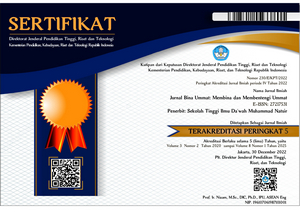MODEL OF DA'WAH AND MOSQUE-BASED EDUCATION CASE STUDY OF REVIEWING CHILDREN WALADUN SHOLIH MASJID AL-FURQAN OF DEWAN DA'WAH
DOI:
https://doi.org/10.38214/jurnaldawahstidnatsir.v5i1.126Keywords:
Children's recitation, Waladun Sholih, a mosque-based and educational model.Abstract
Research purposes:This study aims to uncoverthe model of education and coaching carried out by the Waladun Sholih Children's Study at the al-Furqan mosque of the Indonesian Islamic Da'wah Council. Research Methods: Qualitative. Research result:Two models of education conducted by PA. Waladun Sholih. The first model isthe children registered by their parents are then intensively trained and directed to the correct understanding and practice of Islam, in accordance with the Qur'an and as-Sunnah. At this stage, the trust of parents/guardians in what we do is the most important capital. So, of course, a well-organized work system is needed, starting from the provision of educators, compiling the curriculum and schedule to procuring the facilities. The second model is by activating the participation of parents of students to take quarterly monthly general recitations at the Al-Furqan Mosque as well as to follow reports on their children's educational progress. There are four targets that Pengjian Waladun Sholih wants to carry out in improving the quality of education and achieving educational targets. The four things include; First; Adjustment of Materials and Methods of Delivery to the level of student acceptance, which includes aspects of Reason, Appreciation and Skills. Second; Curriculum Improvement and Addition of Subject Matter. Third; Distribution of Report Values according to the observed Educational aspects. It is deemed very necessary for educators, students and parents/guardians. Fourth: Improving the structure of education levels and the period of each level.
Published
Versions
- 2024-08-25 (4)
- 2022-07-24 (1)
How to Cite
Issue
Section
This work is licensed under a Lisensi Creative Commons Atribusi 4.0 Internasional.
Authors who publish with this journal agree to the following terms:
- Authors retain copyright and grant the journal right of first publication with the work simultaneously licensed under a Creative Commons Attribution License that allows others to share the work with an acknowledgment of the work's authorship and initial publication in this journal.
- Authors are able to enter into separate, additional contractual arrangements for the non-exclusive distribution of the journal's published version of the work (e.g., post it to an institutional repository or publish it in a book), with an acknowledgment of its initial publication in this journal.
- Authors are permitted and encouraged to post their work online (e.g., in institutional repositories or on their website) prior to and during the submission process, as it can lead to productive exchanges, as well as earlier and greater citation of published work (See The Effect of Open Access).




